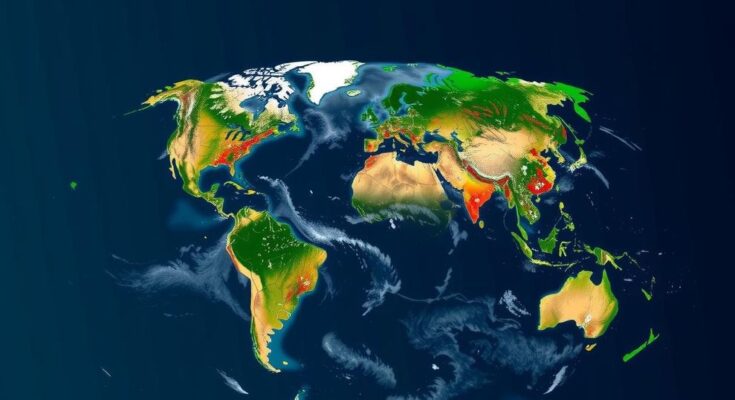Key climate news from October 21-25, 2024, includes over 80% of nations missing the deadline to submit biodiversity plans prior to COP16, a UN warning of potential 3.1°C global warming, a plea from the UN Chief for actionable commitments at COP16, casualties from Typhoon Trami in the Philippines, and a global coral bleaching event affecting 77% of coral reefs—the largest on record.
This week’s review highlights significant developments in climate news, including the alarming delays in nations submitting their biodiversity plans ahead of COP16, a stark warning regarding potential global temperature rises, the urgent message from the UN Secretary-General to COP16 delegates, tragic fatalities caused by Typhoon Trami in the Philippines, and a record-breaking coral bleaching event affecting a vast majority of the world’s coral reefs. 1. Delayed Biodiversity Commitments: A staggering 80% of nearly 200 nations have missed the deadline for submitting their National Biodiversity Strategy and Action Plans (NBSAPs) designed to combat biodiversity loss. Only 32 of the 193 Parties to the Convention on Biological Diversity (CBD) submitted their plans before the United Nations COP16 conference in Cali, Colombia. Countries like Australia, China, and Mexico were among the few megadiverse nations submitting their strategies. Notably, the United States was not a signatory to the CBD. 2. Concerning Temperature Predictions: A new report from the United Nations has indicated that current pledges could lead to a terrifying increase in global temperatures by up to 3.1°C this century. To adhere to the Paris Agreement’s goals, a nearly 50% reduction in greenhouse gas emissions is required within the next decade. The report emphasizes the technical feasibility of limiting warming to 1.5°C, contingent upon enhanced global reliance on renewable energy sources. 3. UN Chief Advocates for Action: At the COP16 opening, the UN Secretary-General urged nations to transform their commitments into concrete actions. He emphasized that the ongoing decline in global biodiversity necessitates immediate and effective governmental response. The summit is a crucial platform since it follows the adoption of the Kunming-Montreal Global Biodiversity Framework two years prior, which sets ambitious targets for biodiversity preservation by 2030. 4. Impact of Typhoon Trami: Typhoon Trami has wreaked havoc in the Philippines, resulting in at least 14 fatalities and extensive evacuations as over 500 mm of rainfall inundated northern provinces. This catastrophic event underscores the rising intensity of natural disasters attributable to climate change, causing widespread flooding and displacement. 5. Record Coral Bleaching Event: The National Oceanic and Atmospheric Administration (NOAA) has reported that the ongoing global coral bleaching event is the largest recorded thus far, impacting 77% of coral reefs worldwide. Scientific data suggests that the spatial extent of bleaching is increasing at an unprecedented rate, raising concerns regarding the long-term health of coral ecosystems.
The week of October 21-25, 2024, witnessed critical global climate issues taking center stage. With biodiversity under threat, there is mounting concern about nations’ commitment to environmental pledges. As the world grapples with rising temperatures and severe weather events like Typhoon Trami, the urgency for collective action among nations has never been more pressing. The situation is further compounded by alarming reports regarding the state of coral reefs, highlighting significant ecological ramifications arising from climatic changes. The context of these events is bounded within the larger framework of international agreements aimed at combating climate change and preserving biodiversity, serving as a critical reminder of the interconnectedness of these global challenges.
In summary, the week’s climate news has underscored the urgency for nations to fulfill their environmental commitments as both biodiversity and ecosystems face dire threats. Delays in submitting biodiversity strategies, stark warnings about temperature increases, the devastating impact of Typhoon Trami, and the unprecedented scale of coral bleaching highlight the need for immediate and substantial action. As delegates gather for COP16, the call for effective implementation of promises made becomes increasingly urgent; timely actions are required to avert catastrophic consequences for our planet’s future.
Original Source: earth.org




